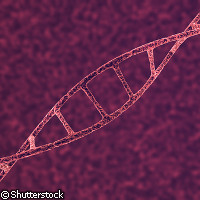Scientists identify gene common to many cancers
An international team of researchers has found that the UTX gene, which is found on the X chromosome, is involved in several types of cancer. The newly discovered gene was found to play an important role in 10% of cases of multiple myeloma, 8% of oesophageal squamous cell carcinomas and 1.4% of renal cell carcinomas tested. The findings are reported in the journal Nature Genetics. Within our cells, DNA is wound around proteins called histones. Adding or removing simple chemical groups such as methyl to or from the DNA results in a change in the strength of the association between the DNA and histones; this process, called methylation, has recently become a focus of several cancer studies. Changes to core histone proteins that take place in the later stages of protein synthesis can ultimately result in alterations that influence cell proliferation, differentiation and death. Such modifications are controlled by enzymes and the protein directed by the UTX gene is an example of an enzyme that regulates histone modification under normal circumstances; it accordingly plays a role in regulating the overall activity of many genes. The researchers carried out a large-scale DNA sequencing study and examined mutations in thousands of cancer genes, looking specifically at mutations of the histone methylation machinery. They identified 39 'inactivating' mutations in 1,390 cancer samples in UTX. This is the first example of mutations found in a gene of this functional class. 'UTX is an important component of the transcriptional control machinery - it influences some of the most fundamental mechanisms controlling gene activity in our cells,' explained Dr Andy Futreal of the Cancer Genome Project at the Wellcome Trust Sanger Institute in the UK. 'Unlike many cancer genes, UTX does not appear to be directly involved in cell division or cell death but in basic gene regulation and shows the depths to which cancers will plumb in order to get themselves ready to go.' The rare mutations found in the UTX gene were observed in clear-cell renal (kidney) cancer. Further study unveiled mutations in many other types of cancer, including 1 in 10 cases of multiple myeloma and 1 in 12 of oesophageal cancer cases. The researchers confirmed their hypothesis that cells lacking a functional UTX gene would show significant growth slow-down when a copy of 'normal' UTX was reintroduced. 'These results provide strong evidence for UTX as the first mutated histone demethylase gene that is associated with human cancer,' the study concludes, 'indicating that genetic mechanisms may underpin a substantial component of epigenetic deregulation in cancers.' 'This work shows that mutations in genes with different functions can be found in human cancer through systematic approaches,' said Professor Victor Velculescu of Johns Hopkins Kimmel Cancer Center in the US. 'These results indicate that cancer genes are not restricted to 'classical' roles of survival and cell proliferation, but can affect a variety of other cellular mechanisms.' The findings open up a whole new class of cancer genes for study. The genes are pivotal in controlling gene activity and preventing cells from turning cancerous. Mutations in UTX, the researchers found, lead to changes in the activity of other genes. 'This is a genetic change with consequences at the level of epigenetic regulation,' said Professor Mike Stratton of the Sanger Institute. 'When we look at cancers, a substantial proportion of the epigenetic disregulation may well have a genetic basis.' Several of the researchers are members of the International Cancer Genome Consortium (ICGC), which seeks to catalogue genetic abnormalities in 50 different tumour types. Uncovering new regulatory genes such as UTX contribute significantly to the group's efforts to comprehensively describe different cancers. Such descriptions will, it is hoped, open up opportunities to reduce the global cancer burden. The European Commission is an observing member of ICGC.
Countries
China, Netherlands, United Kingdom, United States



